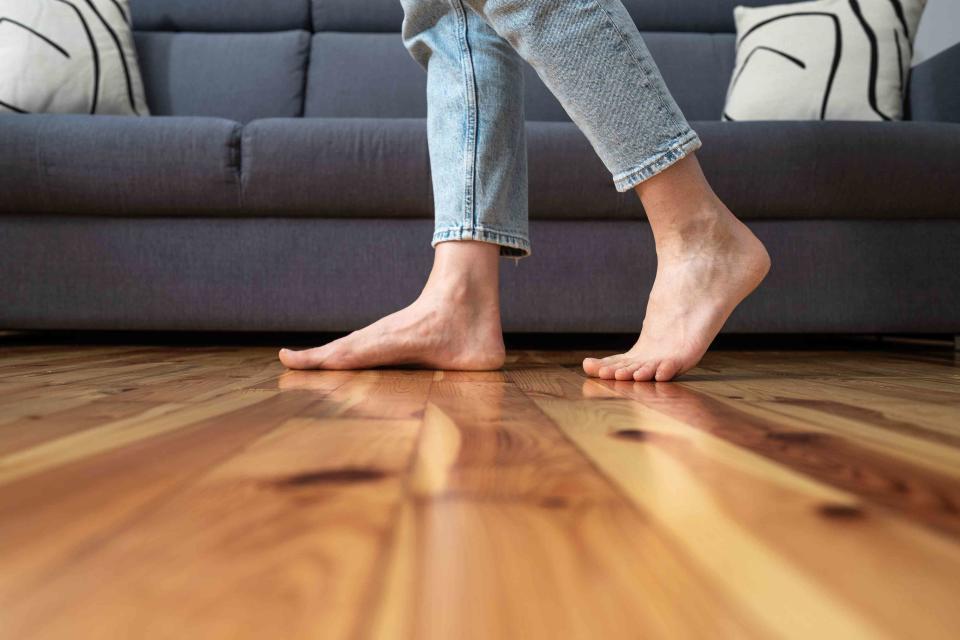How Much Does It Really Cost To Refinish Hardwood Floors? Experts Confirm
Here's what you can expect to shell out for spruced up floors.

brizmaker / Getty Images
There’s just something about hardwood floors—in fact, according to the 2024 U.S. Houzz Kitchen Trends Report, some 24% of renovating homeowners opt for it. But hardwood takes a beating from the collateral damage of everyday living, and they can also start showing their age through scratches, dullness and discoloration, says Anne Colby, Houzz U.S. editor and spokesperson.
What's wonderful about hardwood though is that they have more than one life in them. “The typical three-quarters-inch-thick hardwood floor can be sanded about six to eight times during its lifetime,” Colby says. “Refinishing the wood can restore its original appearance and shine [and] change its color or finish,” she says.
Best of all? It can be less expensive than buying new flooring. But how much, exactly, are we talking to refinish hardwood floors? We turned to experts, who confirmed what you can expect to pay.
Related: Everything to Know Before Starting a Kitchen Remodel
Meet Our Expert
Kurt Clason, Second Vice-Chair of the National Association of Remodelers and Founder of Clason Remodeling Company in New Hampshire
Anne Colby, Houzz U.S. Editor and Spokesperson
What Is the Average Cost Range for Refinishing Hardwood Floors?
According to 2024 data from Angi, homeowners spend an average of $1,879 to refinish hardwood floors, but prices can range from $600 to $4,500. Houzz estimates are a bit lower, suggesting the average cost is about $1,300.
Kurt Clason, second vice-chair of the National Association of Remodelers and founder of Clason Remodeling Company, says of his business, “We generally charge between $2.50 and $4 per square foot for finishing." (This does not including staining, which is optional.) Any needed repairs to the wood are priced by the hour, with ranges varying around the country from probably $50 an hour on the low end to $100 or even more in metropolitan areas like New York.
Tips
On average, you'll need to refinish hardwood floors every 10 years or so.
Factors Affecting the Cost of Refinishing Hardwood Floors
Clason and Colby both note that most floor refinishers charge by the square foot. However, so many variables can affect how much time is needed for each job that estimating by square footage alone is problematic, Clason says. “It's a horrible price estimator. But everybody, every single customer always wants a square foot price. It's a bad way of doing jobs. But it's standard so it's hard to get away from it.”
That means there’s lots to keep in mind when getting a price for refinishing hardwoods. The condition of the existing floor, the type of wood, and repairs needed can all have a significant impact on the work—therefore cost—involved. And if there’s old flooring installed over the hardwood, the cost to remove that and haul it away can also add up quickly.
Related: Is Engineered Wood a Good Choice for Floors? An Explainer for This Man-Made Material
Additional Cost Considerations
“It’s important to keep other considerations in mind, too," Colby says. “Particularly small spaces like closets or staircases, for example, can actually be more costly to refinish than large, easy-to-access spaces. Other factors that may impact cost include your region, your home’s accessibility, and the color of the stain, as dark stains may take more prep time.”
“Beyond those, you may also consider the additional cost to hire a professional mover to get your furniture out of the way,” Colby adds. In Clason’s experience, clients have properly moved furniture out of the way only about half the time, leaving the work for the flooring crew, which of course tacks on additional expense.
As well, “wood floor refinishing jobs often take a few days, which includes time to let the new finish dry and for the fumes to dissipate,” Colby says. An expense many of us may not have considered is finding another place to stay during the project.
DIY vs. Professional Refinishing
How about the DIY route? You can do it on your own timeframe, without waiting for a pro to have availability, which is very tempting. And there’s no question that DIY, on the surface at least, is far less expensive than hiring a pro. “Your labor is free,” Clason points out. And a sander can be rented for less than a hundred dollars a day (not counting the sandpaper). But, he adds, “if you've never run a drum sander before, the easiest way to screw a floor up is to try it for the first time on your house.”
It’s an art to run these machines, he says, and a novice can “gouge the heck out of a floor.” A sloppy paint job can be remedied easily enough, but a mistake sanding your floor? “Sanding too aggressively could lead to damage that impacts your future ability to refinish the wood, and may even necessitate expensive flooring replacement,” Colby says. Ouch.
There’s a difference in equipment as well. “Professional floor refinishers on Houzz caution that rental companies typically only offer 110-volt sanders (whereas the pros use 220-volt equipment), so it’s more difficult to achieve the same results,” she says. Clason puts it a little more bluntly: Rental equipment he’s seen at big box stores can be “one step away from going to the dumpster.” At the end of the day, Colby says, “By the time you’ve acquired all the tools you need and invested the time, the cost savings may be minimal.”
Related: How to Clean Hardwood Floors Without Chemicals
For more Real Simple news, make sure to sign up for our newsletter!
Read the original article on Real Simple.

